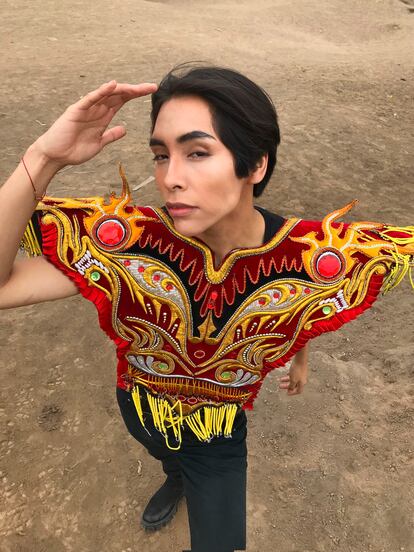Lenin Tamayo: the K-pop revolution in Quechua
Inspired by the South Korean genre, the Peruvian singer is shaking up the music scene by combining it with Andean folklore and the Incan language

He is a Peruvian named Lenin, like the leader of the Russian Revolution. He sings in Quechua, the language of the Incas, and he looks quite a bit like a South Korean K-pop star. Len Tamayo Pinares personifies the spirits of three continents, a one-of-a-kind individuality that is often dismissed on social media, a world with which he has a love-hate relationship. However, social media has finally succeeded in bringing the performances and music of this artist to the public eye and ear, as measured by virtual hearts: Lenin now boasts over four million likes on his official TikTok account.
From a rooftop overlooking the blank walls of buildings in the Comas district of northern Lima, Lenin sounds like a music veteran when talking about his career. At 23, he obsesses over metrics instead of building a community of followers. His aim isn’t to seek fame, but rather to create a lasting impact and, most importantly, to inspire and offer hope to those who’ve faced discrimination and are still searching for their path. “Artists don’t just sing or play instruments — they have the power to arouse a conscience, especially when it means reclaiming one’s identity in an unequal and unjust country,” he said, running his fingers through his hair.
Some cats are taking naps nearby as we speak in Lenin’s new home. About three months ago, he moved in with three musician friends to make his first album, which he’ll call Amaru (snake). Nael and Rutti, two of his friends, are currently tweaking one of the songs in the recording room. Yolanda Pinares, Lenin’s mother, is recording our interview on a tablet. Pinares is a renowned folk singer whom Lenin never fails to mention in every interview, saying that she taught him everything.
And he’s right. Before creating his Andean brand of South Korean K-pop music, Lenin grew up backstage, where Yolanda used to breastfeed him before performances. Music has been his solace and oxygen ever since. At home he listened to all kinds of music, from Alborada (a Peruvian music group that performs Andean music) to Mercedes Sosa (an Argentine folk singer), and even Los Kjarkas (a Bolivian folk band). Lenin eventually added the sounds of his own generation — anime theme music (his favorite is Digimon), the melodic pop of Girls’ Generation, the worldwide phenomenon of BTS and lately the lightheartedness of Rosalía. The result is a musical melting pot the internet has dubbed Q-pop, available just a few clicks away.

Although he was born in Lima, Lenin never had to learn Quechua, as it was always part of his life. Yolanda, who was born in Cusco and lived for years in Abancay — both Andean cities — spoke to him in Quechua since he was an infant. It’s one of their strongest bonds, this language of Tahuantinsuyu, the Incan empire that ruled over parts of Ecuador, Peru, Bolivia and Chile. When they want to touch on a personal topic or joke around, they do it in Quechua. Yolanda would pack Lenin’s school lunchbox with “cancha” (toasted corn kernels), beans and “tarwi” seeds, foods that grow in the mountains and along riverbanks of the Peruvian highlands.
These family customs often made Lenin the butt of jokes and ridicule. He clings to his Andean culture and doesn’t fit in very well in Peruvian coastal communities, and even less so in the capital. Woe to those who choose to swim against the current. Lenin was also mocked by schoolmates for his looks — a thin face, pointy jaw, sharp eyes, bushy eyebrows, and slim physique. But now the attributes for which he was once rejected are the ones his audience loves.
After winning a contest held by the National University of San Marcos (Lima) psychology department, Lenin fully committed to creating music. He’s now working on a thesis, which he plans to present along with his first album. On his tablet, he shows me his progress on six chapters of the research paper. Lenin is undecided about the thesis title. Maybe “Psychosocial Exploration in Contemporary Andean Music as an Agent of Change and Empowerment for Minorities.” Or perhaps “Amaru: Sound Fusions for Social Transformation: a Psychosocial Analysis of the Impact of Andean Music on the Collective Consciousness.”
The Amaru album will have three tracks, each with four previously unreleased songs. Each track will be anchored in Inca mythology: Kay Pacha (the world of the living), Uku Pacha (the world of the dead) and Hanan Pacha (the celestial realm). Amaru is a loose adaptation of several Andean myths and legends. The musical background will feature Andean instruments like the zampoña (panpipe), charango (Andean lute), pututo (shell trumpet), chajchas (percussion rattle) and rain sticks. The vocals and dance routines will mostly be performed by Lenin. To be fully appreciated, his performances must be seen live, as he draws lyrical pictures in Quechua and dances like a South Korean pop star wrapped in swaths of multicolored cloth. In mid-June, Lenin and his team will go to Cusco with some film school students to record the album’s first video clips.
Lenin is a self-managed artist working in a risky business. He edited his first video clips released in January 2020, choreographed all his dance routines and designed his own outfits, which usually include patches and accessories from the highlands. Lenin has performed in four Peruvian cities so far — Cusco, Trujillo, Arequipa and Lima. But he aspires to perform more frequently as he wants to be “a stage artist, not just a studio artist,” just as his mother Yolanda advised him. Lenin was born at six months and four days old, and spent his first three months of life in an incubator. Anyone who came into this world weighing less than four pounds (1.8 kilos) is surely a fighter. And Lenin — the inventor of Q-pop — is winning the battle to make his mark in music.
Sign up for our weekly newsletter to get more English-language news coverage from EL PAÍS USA Edition
Tu suscripción se está usando en otro dispositivo
¿Quieres añadir otro usuario a tu suscripción?
Si continúas leyendo en este dispositivo, no se podrá leer en el otro.
FlechaTu suscripción se está usando en otro dispositivo y solo puedes acceder a EL PAÍS desde un dispositivo a la vez.
Si quieres compartir tu cuenta, cambia tu suscripción a la modalidad Premium, así podrás añadir otro usuario. Cada uno accederá con su propia cuenta de email, lo que os permitirá personalizar vuestra experiencia en EL PAÍS.
¿Tienes una suscripción de empresa? Accede aquí para contratar más cuentas.
En el caso de no saber quién está usando tu cuenta, te recomendamos cambiar tu contraseña aquí.
Si decides continuar compartiendo tu cuenta, este mensaje se mostrará en tu dispositivo y en el de la otra persona que está usando tu cuenta de forma indefinida, afectando a tu experiencia de lectura. Puedes consultar aquí los términos y condiciones de la suscripción digital.









































